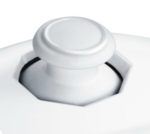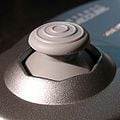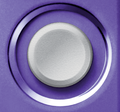Control stick: Difference between revisions
(Making it clear the Circle Pad Pro doesn't work with Smash) |
m (somewhere on smashboards) |
||
| Line 5: | Line 5: | ||
The '''control stick''', also known as the '''analogue stick''' or '''joystick''', is the gray stick on the Nintendo [[GameCube]] and [[Nintendo 64]] [[controller]]s, the white stick on the [[Nunchuk]], the two white sticks on the [[Classic Controller]], and the white or black sticks of the [[Wii U GamePad]] and [[Wii U Pro Controller]]. | The '''control stick''', also known as the '''analogue stick''' or '''joystick''', is the gray stick on the Nintendo [[GameCube]] and [[Nintendo 64]] [[controller]]s, the white stick on the [[Nunchuk]], the two white sticks on the [[Classic Controller]], and the white or black sticks of the [[Wii U GamePad]] and [[Wii U Pro Controller]]. | ||
The [[Nintendo 3DS]] has a '''Circle Pad''', a sliding gray pad that serves as a handheld counterpart to the control stick. A peripheral for the 3DS, the Circle Pad Pro, adds an extra circle pad on the right side. However, {{for3ds}} is not compatible with the Circle Pad Pro, despite being compatible with the [[C-Stick]] on the New Nintendo 3DS. | The [[Nintendo 3DS]] has a '''Circle Pad''', a sliding gray pad that serves as a handheld counterpart to the control stick. A peripheral for the 3DS, the Circle Pad Pro, adds an extra circle pad on the right side. However, {{for3ds}} is not compatible with the Circle Pad Pro, despite being compatible with the [[C-Stick]] on the New Nintendo 3DS. This is due to hardware limitations in the standard 3DS that are not present in the New 3DS, due to its better hardware. | ||
==Overview== | ==Overview== | ||
In the ''{{b|Super Smash Bros.|series}}'' series, the control stick has four primary directions that can be input. During gameplay, tilting the control stick sideways will make a [[character]] walk in that direction. Tilting the control stick downward will make a character [[crouch]] if on the ground or [[fast fall]] if the character is airborne. Tilting the control stick upwards will cause a character to [[jump]], but only if the Tap Jump control function is enabled for the player. Inputting a regular attack while the control stick is tilted will result in a [[tilt attack]]. The control stick can also be directed in diagonal directions, which will allow for more precise movement in the air as well as allowing some [[attack]]s to be [[Angling|angled]]. Pushing this control stick hard will result in [[dashing]] and also increases the power of moves such as [[Samus]]'s [[Missile]]. If outside of gameplay, the control stick can be used to navigate the [[menu]]. | In the ''{{b|Super Smash Bros.|series}}'' series, the control stick has four primary directions that can be input. During gameplay, tilting the control stick sideways will make a [[character]] walk in that direction. Tilting the control stick downward will make a character [[crouch]] if on the ground or [[fast fall]] if the character is airborne. Tilting the control stick upwards will cause a character to [[jump]], but only if the Tap Jump control function is enabled for the player. Inputting a regular attack while the control stick is tilted will result in a [[tilt attack]]. The control stick can also be directed in diagonal directions, which will allow for more precise movement in the air as well as allowing some [[attack]]s to be [[Angling|angled]]. Pushing this control stick hard will result in [[dashing]] and also increases the power of moves such as [[Samus]]'s [[Missile]]. If outside of gameplay, the control stick can be used to navigate the [[menu]]. | ||
Revision as of 12:37, October 23, 2014
The control stick, also known as the analogue stick or joystick, is the gray stick on the Nintendo GameCube and Nintendo 64 controllers, the white stick on the Nunchuk, the two white sticks on the Classic Controller, and the white or black sticks of the Wii U GamePad and Wii U Pro Controller.
The Nintendo 3DS has a Circle Pad, a sliding gray pad that serves as a handheld counterpart to the control stick. A peripheral for the 3DS, the Circle Pad Pro, adds an extra circle pad on the right side. However, Super Smash Bros. for Nintendo 3DS is not compatible with the Circle Pad Pro, despite being compatible with the C-Stick on the New Nintendo 3DS. This is due to hardware limitations in the standard 3DS that are not present in the New 3DS, due to its better hardware.
Overview
In the Super Smash Bros. series, the control stick has four primary directions that can be input. During gameplay, tilting the control stick sideways will make a character walk in that direction. Tilting the control stick downward will make a character crouch if on the ground or fast fall if the character is airborne. Tilting the control stick upwards will cause a character to jump, but only if the Tap Jump control function is enabled for the player. Inputting a regular attack while the control stick is tilted will result in a tilt attack. The control stick can also be directed in diagonal directions, which will allow for more precise movement in the air as well as allowing some attacks to be angled. Pushing this control stick hard will result in dashing and also increases the power of moves such as Samus's Missile. If outside of gameplay, the control stick can be used to navigate the menu.
On the Classic Controller, Wii U GamePad, and Wii U Pro Controller, the left control stick is used for movement, while the right control stick (officially called "right stick"), analogous to the GameCube C-Stick, is used for smash attacks. When the control stick is pushed in any direction, the pertaining smash attack will be executed immediately.
When holding the Wii Remote sideways, the directional pad serves as the control stick, as there are no control sticks on the Wii remote alone.
Gallery
The Circle Pad of the Nintendo 3DS
The Control Stick on the Wii U GamePad (top)
| Controllers and buttons | |
|---|---|
| Nintendo 64 controller | |
| GameCube controller | |
| Wii Remote (and Nunchuk) | |
| Classic Controller | L |
| Nintendo 3DS | |
| Wii U GamePad / Pro Controller | L |
| Joy-Con | |
| Switch Pro Controller | L |
| Third-party controllers | Hori Mini Pad · Arcade controller · Keyboard |
| Other | Smash Controller · Controller modification |





